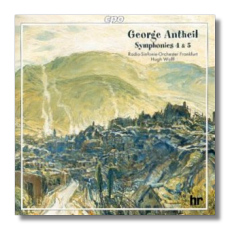
The Internet's Premier Classical Music Source
Related Links
- Antheil Reviews
- Latest Reviews
- More Reviews
-
By Composer
-
Collections
DVD & Blu-ray
Books
Concert Reviews
Articles/Interviews
Software
Audio
Search Amazon
Recommended Links
Site News
 CD Review
CD Review
George Antheil

Symphonies #4 & 5
- Symphony #4 "1942"
- Symphony #5 "Joyous"
- Decatur at Algiers
Frankfurt Radio Symphony Orchestra/Hugh Wolff
CPO 999706-2 DDD 63:03
The George Antheil revival gathers steam with at least the third major release in the last six months. [Wolff and the Radio Symphony Frankfurt have already recorded Symphonies 1 and 6 (CPO 999604-2), and Thomas Kuchar's disc of Symphonies 4 and 6 (Naxos 59033) was released at about the same time.]
Music critic Louis Biancolli wrote in the 1940s, "All in all, it [an Antheil symphony] made for good symphonic fun and even if Antheil isn't exactly the American Shostakovich, I would see no real harm if the Russians suddenly began calling Shostakovich the Russian Antheil." The parallels are striking, from nagging rhythms to a hammering xylophone and alternately melancholy and bumbling woodwind solos. Perhaps Shostakovich and Antheil were trying to say similar things about the war that gave Antheil's symphony its subtitle. However, there are hints of Charles Ives as well. The symphony's first performance was given in 1944 by no less than Leopold Stokowski and the NBC Symphony Orchestra. Kuchar's recording makes the work sound more shocking; Wolff's German orchestra is more refined than the Ukrainians, and the American conductor is slightly more expansive than Kuchar.
The Sixth Symphony occupied Antheil between 1947 and 1948. The subtitle probably alludes to the end of World War Two and also to the composer's optimism – not entirely justified by reality – about his career. Eugene Ormandy and the Philadelphia Orchestra premièred the work. It was this symphony that Biancolli was referring to in the passage quoted above, not the Fourth; change the name Shostakovich to Prokofieff and I am in agreement with Biancolli. The first movement uncannily evokes the scherzo of Prokofieff's Fifth Symphony, and there are other hints of this work (and others by Prokofieff) throughout Antheil's symphony. Again, perhaps Prokofieff and Antheil were trying to say similar things about the indomitable spirit of mankind. Annotator Eckhardt van den Hoogen has a lot of fun with these similarities in his booklet note, slyly wondering whether the Russian composers might have been Antheil's twins. For reference, Prokofieff's Fifth Symphony was completed in 1944. There is no reason to accuse Antheil of intentionally copying Prokofieff or Shostakovich, yet he knew their work. On the other, there are Shostakovich-like passages elsewhere in Antheil's canon that predate his familiarity with the Russian composer.
Decatur at Algiers, written in 1944, is described as a nocturne for orchestra. Before one gets carried away with identifying North African elements in this quiet and colorful work, one should know that its earlier title was "Sicily"! At seven minutes, it is a kind of oasis between the Fourth and Sixth Symphonies on this CD.
Wolff and the Radio Symphony Frankfurt are sturdy performers; they might have kept Antheil's "bad boy of music" reputation more in mind as they recorded these works. The engineering is excellent, and, as suggested above, the program notes are everything that program notes should be. Antheil's music is wonderful knockabout fun, and any of these new recordings would be excellent starting points for new listeners.
Copyright © 2001, Raymond Tuttle




















